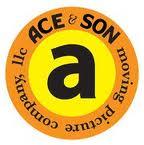
You know the old adage, 'if it ain't broke, don't fix it'? This certainly doesn't apply to Ace and Son. Ace and Son, formerly known as Asterisk has changed names but hasn't changed their solid reputation. For about a decade the production house has been creating high-quality production work in the New York area, including animation, stop-mo and illustration.
If one of the studio's names sounds familiar it should come as no surprise seeing as the studios' client list includes Disney, the Sesame Workshop, Comedy Central and many other high-profile clients.
Richard O'Connor, current owner of the firm recently took time out his successful re-branding campaign to explain to our aspiring animator readers exactly what the animation industry means to him:
What is your firm's focus within animation and what led your firm to have such a focus?
We tend towards esoteric projects like documentaries and non-fiction work although we do produce a good deal of advertising and broadcast work. Non-fiction film has boomed in the past decade, largely thanks to high-quality, low-cost digital equipment and the explosion of specialty cable networks. Not only is there a broad market here, the scope of projects are varied and challenging.
Fill in the blank: The future of animation is _________.
Two or more single frames in sequence.
What are the best and worst aspects about working in the animation field?
The parties, the women and the non stop excitement--which is to say, the opportunity to constantly engage your imagination and create artificial worlds ranks amongst the best.
The worst is, like most crafts in a crass age, aspiring to make high-quality work in a field dominated by garbage.
Among your firm's achievements, which one(s) are you the most proud of?
Always the next project. Currently that's a series of opening films for a prominent international film festival.
What skills/qualities does your firm seek out when hiring new employees?
Technical versatility, solid draughting skills, intellectual and artistic curiosity.
What particular schools, if any, does your firm recruit new hires from? If none, where do you recruit new hires?
We've hired from SVA, Parsons, RISD, Pratt and University of the Arts. These are mostly local schools since entry level positions don't offer the best salaries for artists who need to relocate.
What advice would you give to aspiring animators?
You probably like animation a lot, so I assume you're already doing every day. Keep doing that, but do something else. Read Dickens, study chemistry, learn a trade that you can fall back on since the odds of a successful career in the business are not great--especially for those unfamiliar with Dickens.
What were your most challenging projects, and why?
The most challenging projects are one in which the client gives you more grief than money. In nearly two decades, I've really only had two of those -one a children's series, the other a theatrical film. Both of these came down to trust. The client needs to trust that the animator will deliver a quality product and the animator needs to trust that the client won't rip them off. Only twice were both of these abrogated and it made for difficult obstacles to overcome.
What kind of education did it take to get you where you are today?
General liberal arts education, which continues daily.
What animation software packages does your firm prefer to use? Which one would you recommend to beginners?
Software is a secondary concern for beginners. Anyone can learn it. If you don't understand animation and film making all the technical skills in the universe won't make you a good animator.
We mostly use the Adobe suite -Flash and After Effects. These are typically combined with other media.
Do you think that there is an increasing or decreasing demand for animators overall? Why?
The job title "animator" has changed in the past decade or so. For "animators" there's more work -web stuff, motion graphics, compositing. For "animation artists" which was once the bulk of the industry (inkers, background artists, designers, coordinators, checkers, and on and on) there's significantly less demand. The "animator" may do less animation than in years past, but the work an "animator" does has increased.
Check out more interviews at The Animation Career Review Interview Series.
